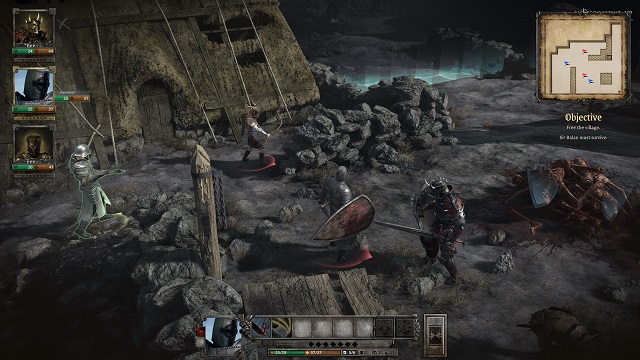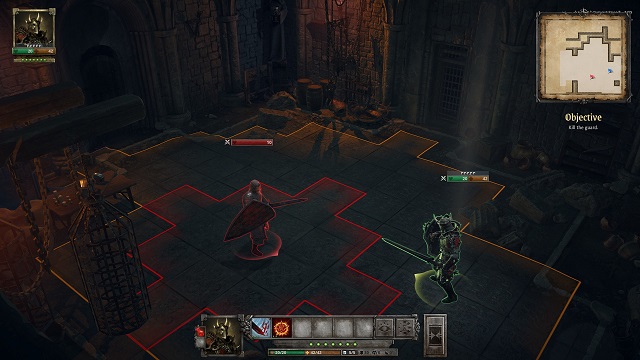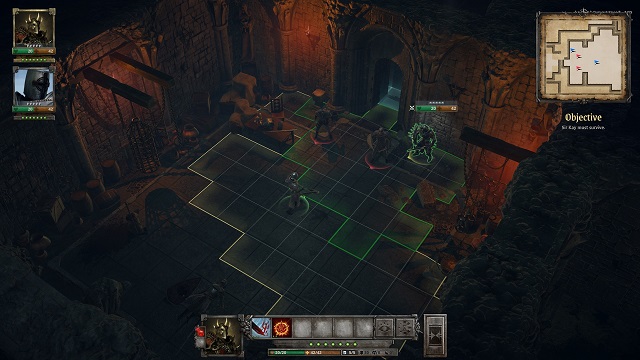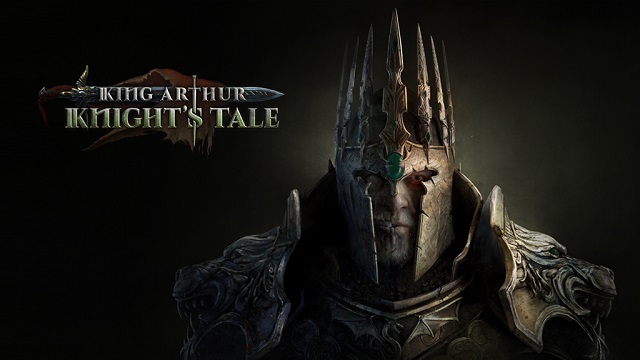Don’t let the screens or trailers fool you: King Arthur: Knight’s Tale is not a Diablo clone. Instead, it’s a turn-based skirmisher set in the time of Arthurian legend. However, this is not Disney-fied, Sword in the Stone Arthur either. This is nasty, grimdark, metal-as-hell Arthur, with zombies, questionable morals, and a strange who’s-actually-the-good-guy subversion.
We got our hands on the Steam Early Access version of King Arthur: Knight’s Tale, which features the game’s first few story missions and a few sidequests, alongside some of the economy management and roleplaying elements that look to feature much more heavily in the final build.
So far, it’s a good start, though it seems like a game whose lofty ambition might be weighing it down just a bit.
King Arthur: Knight’s Tale Early Access Review — Grimdark Tactics

At its most basic level, King Arthur: Knight’s Tale plays a lot like a tabletop RPG. You control a team of heroes (in a fairly morally grey sense of the word) going out on quests to battle a variety of baddies. Bandits, the undead, rogue knights — typical fantasy stuff.
As you progress, you level up your characters, giving them new abilities and outfitting them with better gear. You also make choices that affect your morality, pushing you in different directions on a skill-tree-like chart that changes what characters you can recruit and the decisions you can make.
This is all set in a twisted world of Arthurian legend, where you take on the role of Mordred. You’ve been raised from the dead by the Lady of the Lake to find a destroyed Camelot and an also-raised-from-the-dead Arthur gone mad. You stake your claim to the throne and set out to raise an army and stop the scourge plaguing the land. Depending on the choices you make, you’ll also encounter other heroes of legend along the way.

It’s a good setup for some skirmishes, and each scenario in King Arthur: Knight’s Tale feels familiar if you’ve played other tabletop-inspired turn-based games, such as XCOM, BattleTech, and the like.
Before each scenario, you choose a small team based on the classes you think you’ll need. You outfit them with gear and start your journey. There are branching paths through each mission, so, for example, if you’ve brought a strong force, you’ll probably be able to take some side paths, get in some extra scuffles, and come away richer for it. If your heavy-hitters are on the bench, you may want to beeline straight for the objective.
I was pleased to see just how similar the battles in King Arthur: Knight’s Tale are to something like the tabletop version of Pathfinder. The pandemic wreaked havoc on regular tabletop RPG sessions, and King Arthur scratches that itch nicely, albeit in a simplified way.

Luring enemies into chokepoints where your archers can pick them off, or buffing up a heavily-armored tank and sending them in to scrap is always good fun. Likewise, the stakes are high.
Your characters can suffer wounds that put them out of commission for extended periods of time; if things are bad enough and you aren’t paying attention to status ailments or the odds are stacked against you, they can even die outright. Extremely hardcore players can even play the game on a roguelike setting; you still play through the story, but things are much more randomized and much more permanent.
The snippet of the game I was able to play also offers some glimpses at the big picture of King Arthur‘s campaign, which allows you to rebuild the kingdom of Camelot, recruit new heroes, and build up resources that help you in your quest. You can put captured bandits to work, helping to upgrade your castle, or you can put them to the sword to scare the remaining population into compliance. As you progress, these decisions move you around the game’s morality chart and give you different opportunities for building, recruitment, and more.
There are a lot of big ideas at play in King Arthur: Knight’s Tale, and those big ideas could also wind up being problematic.
This is not a game from a well-known studio (NeocoreGames is probably best known for Van Helsing, though they’ve done a few others), but it has aspirations to come off as one. The opening moments are cinematic and intense, and look as if they’ve been taken straight out of a heavy metal music video. Its morally-ambiguous characters would fit perfectly into some 80+ hour action-RPG hybrid where your early decisions come back to haunt you.

However, it seems doubtful (so far) that those big ideas will fully coalesce.
The voice acting for some characters, even central protagonist Mordred, comes off as amateur as frequently as it doesn’t. Even with my video settings turned way down, a few missions were borderline unplayable due to chugging framerates. On top of that, King Arthur is a game that looks a lot better in screenshots than in motion. My video card is certainly getting a bit long in the tooth, but it can handle plenty of heavy lifting still. I did not expect King Arthur to test it like it did.
The other danger that King Arthur might run into is a lack of differentiation. Though the Early Access version is only a few hours long and there’s still more to come, combat generally plays out a little too much like I planned. In general, tactics can dissolve into “group your biggies together and put your smallies behind them.” The AI struggles with simple ideas like targeting my ranged fighters to smack my beefy bois, making some of the strategy here rather simple.
I generally found that, when I tried to get too cute, things quickly fell apart. I hoped something like a pincer attack, or delaying a move in order to flank my enemies, would pay dividends, but almost universally, I found that things probably would have gone better if I had just charged in like a dummy.
One other problem I ran across was that it’s just hard to parse out a situation at a glance. Many of the status effect icons are tiny and aren’t really explained, and it’s really tough to quickly tell things like enemy difficulty or abilities. Even telling the difference between your own units can be tough, as many of them are just big grey suits of armor. Approaching an enemy is a bit of a crapshoot, as it is not immediately apparent if they’re going to be a tough foe or fall in a single swipe of the sword.
All these issues are things that could get ironed out through the Early Access period, and hopefully will. Learning the mechanics and systems will (hopefully) come with more time playing. Optimizing the way a game runs on different systems and tweaking AI are some of the main reasons developers release games into Early Access, so hopefully, these issues are addressed before King Arthur‘s full release.
King Arthur: Knight’s Tale Early Access Review — The Bottom Line

Pros
- Differentiated take on well-known source material
- Tactical combat feels good and has nice risk-reward balance
- Lots of different systems will push strategizing
Cons
- Some scenarios cause massive framerate issues
- Strategy can take a backseat
- Voice acting could use some polish
When it’s all said and done, I am pleasantly surprised by King Arthur: Knight’s Tale, and I hope the developers can address some of the central issues before its full release.
It’s got the bones of a smart, tactical sandbox that lends a lot of different ways to succeed, but it also seems like it could get bogged down by attempts to be too big for its own britches. We’ll just have to wait and see.
[Note: NeocoreGames provided the early access copy of King Arthur: Knights tale used for this review.]







Published: Feb 2, 2021 05:06 pm